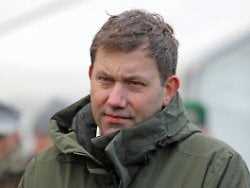Ukraine talk with Markus Lanz
“Do not rule out Ukraine’s NATO membership”
By Marko Schlichting
2/9/2022 5:04 am
Diplomatic talks to resolve the Ukraine crisis have been in full swing since Monday evening. Is Germany putting enough pressure on Russia? At Markus Lanz, SPD leader Klingbeil defends Chancellor Scholz’s course. He rejected Putin’s demand that Ukraine should not join NATO.
Attempts to resolve the crisis in Eastern Europe have entered a new phase. French President Emmanuel Macron met his Russian counterpart Vladimir Putin in Moscow. At the same time, Chancellor Olaf Scholz was in Washington for his inaugural visit. His conversation with US President Joe Biden lasted three hours. Foreign Minister Annalena Baerbock is also trying to find a diplomatic way out of the crisis in Ukraine. The heads of state of the so-called “Weimar Triangle” met in Berlin on Tuesday evening: Poland’s President Duda, France’s Head of State Macron and Chancellor Scholz.
Criticism of the traffic light coalition is growing in this country. Is Scholz really the right person when it comes to crisis solutions? SPD leader Lars Klingbeil is confident. He is one of the talk guests on Tuesday evening with Markus Lanz on ZDF. And in doing so, he drops a small bomb.
“Not ready to rule out NATO membership”
In recent months, Russia’s President Putin has been concerned with weakening NATO. Now he must recognize that he has achieved the opposite, says Klingbeil. NATO member states have repeatedly criticized the military alliance. “Everyone has now learned how important the alliance is,” said Klingbeil. Of course it is right to sit down at a table with Russia. “But I think it’s the wrong way to say that we’re going to rule out or withdraw NATO membership, as Putin is demanding.” He doesn’t believe that Ukraine will join NATO in the next few years, “but I’m not prepared to rule it out either.”
The political scientist and Eastern Europe expert Margarete Klein is helping the SPD leader. “It’s the principle of open doors. We would do well to leave this principle as it is.” Every country has the right to vote freely in the alliances, explains Klein. Of course, NATO must ask itself whether Ukraine’s possible accession would represent a security gain for it. Ultimately, however, Russia has nothing to do with such a theoretical decision.
Putin could have a problem, says the political scientist from the Stiftung Wissenschaft und Politik in Berlin. The NATO-Russia Founding Act, signed 25 years ago in Paris, is still valid. Among other things, it regulates the “independence and territorial integrity of all states.” Klein: “If things continue like this, Putin will come to a situation where this Founding Act is no longer tenable.” Then NATO could be forced to station soldiers and nuclear weapons in Eastern Europe in the long term. “That would be the opposite of what Putin wanted to achieve.”
According to Klein, its most important goal could be a “strategic puzzle”. The Russian president could set up permanent threats to prevent Ukraine from consolidating economically and politically.
“Ukraine not an alliance territory”
If Vladimir Putin orders an invasion of Ukraine, NATO will not fight together with Ukraine against Russia, believes Margarete Klein. “It’s not Alliance territory, it’s not Alliance Case.” It would be different if Russia established a permanent military presence there after its current military exercise in Belarus and cut off the Baltic states from supply lines from Poland.
One thing is particularly important for Klingbeil: Russia must know that it must expect tough measures in the event of a further escalation, Scholz also made a clear statement on this. But it doesn’t make sense to let the head of the Kremlin look at your cards – Putin doesn’t do that either. “I think it’s absolutely unwise to tell Putin what we’re doing,” said Klingbeil. “The moment the Russians act, there are actions coordinated with the United States,” says the SPD leader. This would include sanctions. “All options are on the table.”
